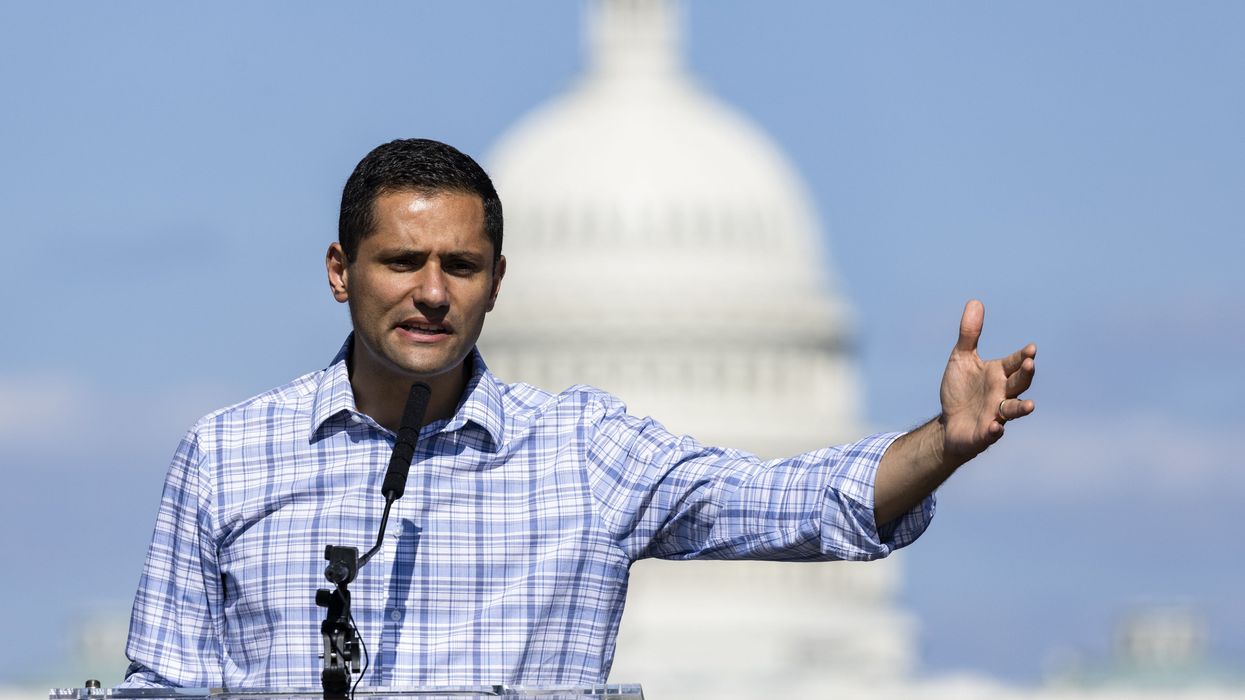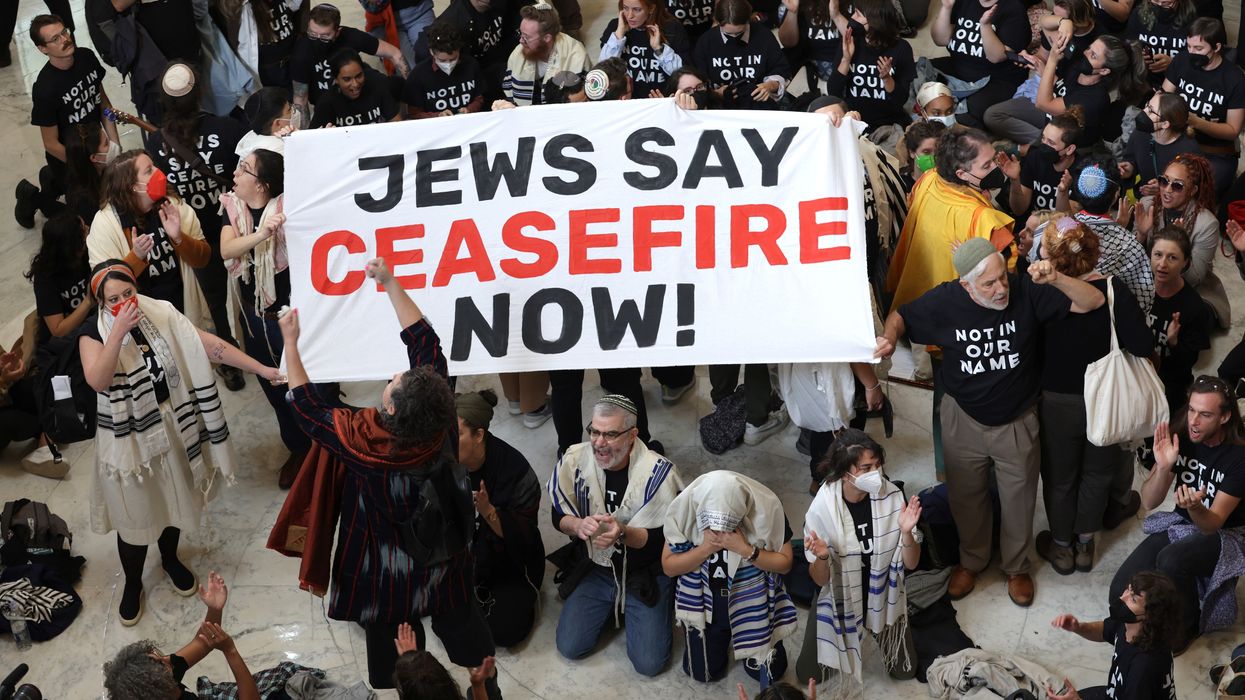Top Dem Speechwriter Says Young Jews' Empathy for Gaza Shows Holocaust Education Has Backfired
"Holocaust education is too successful, it made the kids anti-holocaust while Israel is trying to do one," quipped one prominent critic.
A speechwriter for prominent Democrats including former President Barack Obama and presidential candidates Hillary Clinton and John Kerry faced widespread outrage this week after video emerged of her blaming Holocaust education for young Jews' empathy for Palestinians in Gaza and revulsion at Israel's genocidal war there.
Earlier this week, Sarah Hurwitz—who was also a senior speechwriter for former First Lady Michelle Obama and other Democrats—spoke at the opening plenary of this year's Jewish Federations of North America general assembly in Washington, DC. The event featured speakers including Free Press staff writer Olivia Reingold, who implicitly attempted to absolve Israel from blame for the Gaza famine by noting that 12 of the at least 463 Palestinians who starved to death had preexisting health conditions.
"There have been huge shifts in America on how people think about Jews and Israel, and I think that is especially true of young people," Hurwitz said during the panel discussion, noting the rise of social media as a primary source of news and information.
"Today, we have social media," she added "Its algorithms are shaped by billions of people worldwide who don't really love Jews."
Hurwitz continued:
It's also this increasingly post-literate media. Less and less text, more and more videos, so you have TikTok just smashing our young peoples' brains all day long with video of carnage in Gaza. And this is why so many of us can't have a sane conversation with younger Jews, because anything we try to say to them, they are hearing it through this wall of carnage. So I wanna give data and information and facts and arguments and they are just seeing in their minds carnage, and I sound obscene.
"I think, unfortunately, the very smart... bet we made on Holocaust education to serve as antisemitism education, in this new media environment, I think that is beginning to break down a little bit, because Holocaust education is absolutely essential," Hurwitz asserted.
"But I think it may be confusing some of our young people about antisemitism, because they learn about big, strong Nazis hurting weak, emaciated Jews," she added, "...so when on TikTok all day long they see powerful Israelis hurting weak, skinny Palestinians, it's not surprising that they think, 'Oh, I know, the lesson of the Holocaust is you fight Israel, you fight the big powerful people hurting the weak people.'"
Reaction to Hurwitz' remarks ranged from incredulity to anger.
"I am almost literally speechless," American-Arab Anti-Discrimination Committee nation legal director Jenin Younes said on X. "She's decrying the fact that kids' takeaway from Holocaust education has been that we must protect helpless people from powerful people killing them. The real lesson from the Holocaust, it seems, is that Israel must be able to commit genocide if it wants to."
Argentinian economist Maia Mindel also took to X, writing that it is "extremely grim that a substantial number of very influential people seem to think that the lesson from the Holocaust isn't 'mass murder of civilians based on their ancestry so your nation can take their land is wrong' but rather, 'Fuck you, got mine.'"
Jewish Currents editor-at-large Peter Beinart wrote on X that "the level of condescension" in Hurwitz's commentary "is quite remarkable."
Writer Bryce Greene lamented: "We're at the point where Israels supporters are now claiming that the Holocaust was not bad because it was the powerful attacking the weak."
"No, that would be the wrong lesson from the Holocaust," he added. "According to them it was only bad because Jews were the victims. Real sick shit."
Independent journalist Ahmed Eldin said on X that "Zionism is so morally bankrupt it sees empathy as a design flaw."
Eldin wrote Wednesday on his Substack that "Hurwitz didn’t slip up—she said the quiet part out loud and exposed the Zionist project for exactly what it is."
"She even admitted that, amidst the carnage, she sounds 'obscene,'" he noted. "That admission, said almost accidentally, is the closest thing to honesty her worldview will allow: The problem is not the violence of Zionism itself, but the visibility of it. Zionism, as she inadvertently revealed, depends not on morality but on opacity. The ideology requires not less brutality, but simply fewer witnesses."
Moving on to Holocaust education, Eldin wrote:
According to Hurwitz, Holocaust curricula have “backfired” because they taught young people that “you fight the big powerful people hurting the weak people.” In her telling, this universal ethical principle—this most basic moral intuition—is the problem.
The implication is staggering: the “correct” lesson of the Holocaust, she seems to believe, is not “never again for anyone,” but “never question Israel.” What outrages her is not the suffering of Palestinians but the possibility that young people are recognizing it as suffering.
"A world that is witnessing and seeing Palestinians as human is a world in which Zionism cannot function," Eldin concluded. "A world that sees the violence cannot romanticize the ideology producing it. Once people witness the truth, the mythology cannot be resuscitated and the propaganda cannot be rehabilitated."
"Israel may be able to flatten Gaza’s buildings, but it cannot rebuild the ignorance it once relied upon," he added. "The truth is already out, the narrative collapse well underway, the mask irretrievably gone."


